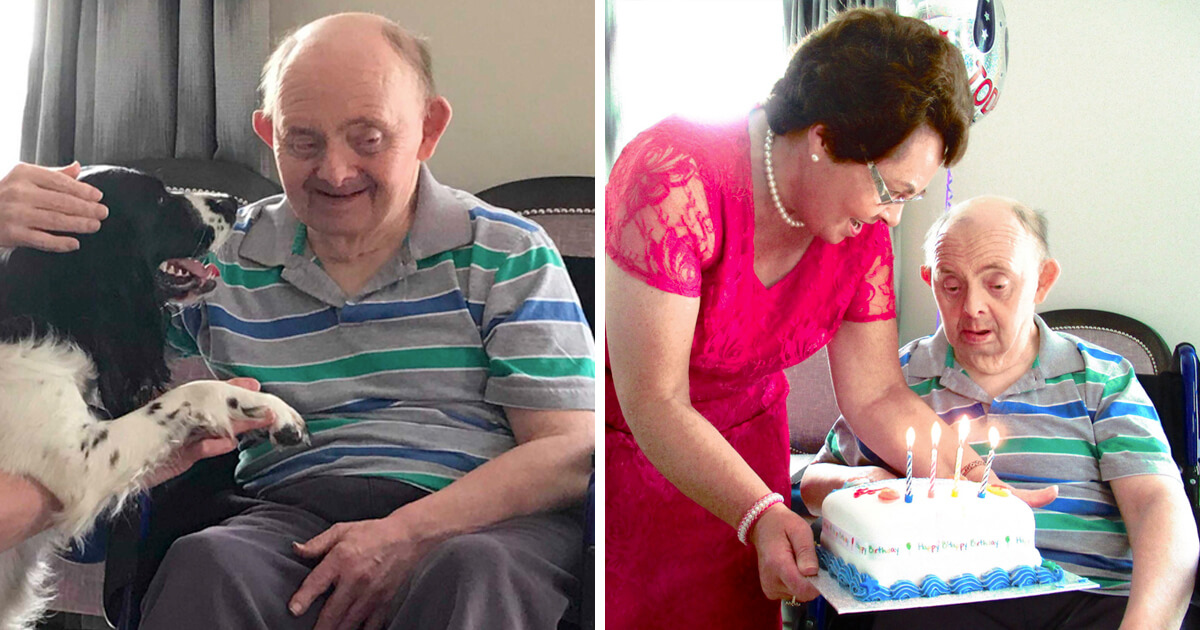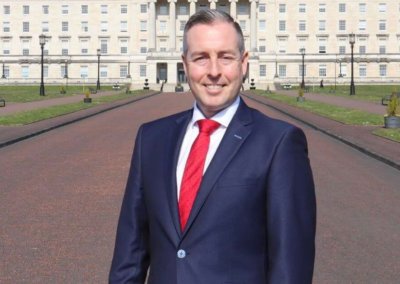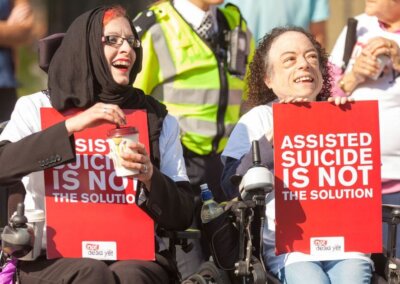A man believed to be Northern Ireland’s oldest person with Down’s syndrome has thrown his support behind a motion calling on MLAs to oppose abortion up to birth for those prenatally diagnosed with the condition.
George McCullagh, whose parents were told he wouldn’t survive past his teenage years, has defied the odds to celebrate his 76th birthday today.
Now, he and his family have declared their support for the pro-life motion tabled by DUP MLAs Paul Givan and Joanne Bunting.
George’s sister, Elaine, told Paul: “We love our ‘wee brother’ and he has brought us so much love and joy. He, himself, has had a great life.”
Tomorrow, the Northern Ireland Assembly will vote on a motion that, if voted for, will highlight the Assembly’s opposition to the UK Government’s plans to introduce abortion on the basis of Down’s syndrome.
It states: “That this Assembly welcomes the important intervention of disability campaigner Heidi Crowter and rejects the imposition of abortion legislation which extends to all non-fatal disabilities, including Down’s syndrome.”
The motion has been tabled in response to Heidi Crowter, the 24-year-old disability campaigner, who spoke out against the proposal of the British Government to impose abortion up to birth in cases of disabilities like her own, Down’s syndrome.
Heidi wrote to Party Leaders at Stormont, asking them to take the lead and do everything they can to oppose abortion on the basis of disability up until birth.
She said: “Please do not let a law come into practice which will end lives on the basis of disability and stop people like me coming into the world.”
While the motion will not change the law if it passes, it will demonstrate to Heidi and other people with Down’s syndrome that Northern Ireland’s elected officials oppose any move to allow babies with Down’s syndrome to be aborted up until birth.
This will send a very important message to MPs in Westminster that Northern Ireland does not want the extreme abortion regime imposed on them from the UK Parliament and Conservative Government.
The new regime, which also allows de facto abortion for any reason up to 24 weeks and disability abortion right up to birth, came into force as law on 31 March.
Despite 79% of consultation respondents stating opposition to changes in Northern Ireland’s abortion legislation, the UK Government went far beyond what was legally required of them when they imposed radical changes to the law governing terminations in the province.
MPs and Peers will vote on the extreme abortion regulations at some point before 19 June.
If MPs vote down the redrafted regulations, the Government will then be forced to draft the regulations for a third time to be either less extreme or bring forward legislation allowing parliament to vote on revoking the regulations.
The second of those options would give back control to the people of Northern Ireland through the Northern Ireland Assembly.
In April, an influential House of Lords committee released a highly critical report raising significant concerns over the Government’s approach in imposing the extreme abortion regime.
In his submission to the committee, Northern Ireland’s Attorney General said that the UK Government exceeded its powers as it radically changed abortion law in the province.
John Larkin QC said: “This is of political and legal significance and, given that the relevant judgement call is best made by a local legislature, it may be inappropriate for the provision to have been so limited in light of the changed political context.”
The Attorney General also told the Secondary Legislation Scrutiny Committee it was “disproportionate” to require healthcare professionals in any capacity “to act contrary to their conscience” and that it “would have been possible” for Westminster to introduce broader conscience protections.
In addition, earlier this month, Northern Ireland peer Baroness Nuala O’Loan called on Northern Ireland residents to “make their voices heard” and demand the new extreme abortion regime regulations are not approved.
A spokesperson for Right to Life UK, Catherine Robinson said:
“We’d like to wish George McCullagh a very happy 76th birthday full of the love and joy he brings to others.
“We’re thankful for this motion, brought by Paul Givan and Joanne Bunting, which will finally break the silence at Stormont tomorrow after MLAs found time to debate bikes before the lives of unborn babies.
“If you live in Northern Ireland, please write to your local MLAs asking them to seek an urgent debate and vote on a resolution to this matter, distancing Northern Ireland from Whitehall’s profoundly ill-conceived abortion disability proposal.”
“If you have already emailed your MLA, please encourage more friends and family to write to their MLAs.”












